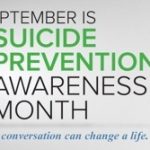September is National Suicide Prevention Month.
Whenever I think about suicide, what it means to me, how I feel about it, the word that always comes to mind is shame. I don’t think you can talk about suicide without talking about shame. I have been heavily immersed in Brene Brown’s research work on shame and vulnerability and the more I learn about it, the more open my eyes are to seeing it everywhere I go. Everyone I have ever known that has struggled with suicidal thoughts or gestures is shrouded in shame for one reason or another—they don’t feel good enough, worthy enough, pretty enough, smart enough, together enough…they feel too broken, undeserving of help or hope, and lost in a sea of “if only’s.”
The thing that strikes me in reading Brene Brown’s work and in applying this to my understanding of suicide, is just how preventable it is. I have always known and believed that, but understanding the role shame plays in it has shed new light on the word prevention. I think of someone who is suicidal as someone who has been walking a path of shame for weeks, months, sometimes years, all leading to feeling suicidal. The path is long and winding and with many stops along the way. Many chances for hope. Many chances for someone to reach out and offer a different path. So why? Why do we lose over 40,000 Americans to suicide each year?* Why is there a suicide attempt every 12.95 minutes?* Why are there approximately 1 MILLION suicide attempts made annually?*
Because of shame. Because of our lack of understanding of shame. Because of our fear of talking about shame.
We are infiltrated on a daily basis by messages of perfection, messages that encourage shame and discourage self discovery. We are plagued by the disease of comparing ourselves to others and constantly feeling not good enough. We think in terms of social media Likes and want to make sure we present our best looking, happiest, and most connected selves on Facebook, Instagram, and twitter. I have clients as young as 14 coming into my office completely depressed and hopeless because of something someone at school posted on Twitter, because their friends get more Likes than them, because someone made fun of their profile picture. The world has become so completely technologically connected that we have lost touch with what actual connection means. When I go to the store, or for a walk, or to get gas, I am always struck by what people are doing while they are waiting or walking or standing. They are on their phones. Not looking up. Not engaging. Not connecting to the world around them. How on earth can we be our most authentic selves if we are only putting what we think is our most “perfect” self out into the world via social media? That’s a lot of pressure. And it is incredibly lonely.
Bene Brown writes in The Gifts of Imperfection, “Our sense of worthiness—that critically important piece that gives us access to love and belonging—lives inside of our story.” Our story can be found in our imperfections and our vulnerabilities. If we don’t own our story, we flounder. We float around looking for something to grab onto to give us a sense of purpose and belonging. Without it the path of shame and not being enough becomes a path leading to hopelessness, helplessness, and feelings of not wanting to exist any more.
Suicide prevention month should be about putting down our devices and connecting with the people in our lives. Really connecting. That means sharing our stories, embracing our imperfections, and allowing the light to wash out the darkness that is shame.
If you or someone you know is struggling please call us. We can help. And you are not alone.
*Source: American Foundation for Suicide Prevention
Resources:




